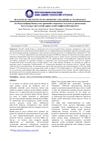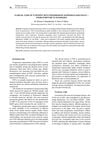 September 2023 in “Kerala Journal of Ayurveda”
September 2023 in “Kerala Journal of Ayurveda” Ayurvedic treatment helped a woman with PCOS resume regular periods and improve symptoms without side effects.
 September 2023 in “Asian journal of beauty & cosmetology”
September 2023 in “Asian journal of beauty & cosmetology” Lipids are important for healthy hair, but their exact role is not fully understood and needs more research.
 September 2023 in “medRxiv (Cold Spring Harbor Laboratory)”
September 2023 in “medRxiv (Cold Spring Harbor Laboratory)” Long-COVID has diverse, long-term health impacts, especially in young people.
 July 2023 in “Journal of Natural Remedies”
July 2023 in “Journal of Natural Remedies” Shell ginger contains kavalactones that promote hair growth and have anti-cancer, anti-inflammatory, and anti-obesity effects.
 June 2023 in “International journal of research in ayurveda and pharmacy”
June 2023 in “International journal of research in ayurveda and pharmacy” Dhatryadi Rasayana, an Ayurvedic herbal mix, may be a safe and effective way to prevent premature hair greying.
 May 2023 in “Archives of dermatological research”
May 2023 in “Archives of dermatological research” Some factors like thyroid disease, diabetes treatment, hair dryers, natural hairstyles, and scalp conditions can affect the treatment results for a hair loss condition called CCCA.
 April 2023 in “Acta Poloniae Pharmaceutica”
April 2023 in “Acta Poloniae Pharmaceutica” Herbal extract shampoo increased certain minerals in hair and improved hair growth and scalp health.
 March 2023 in “Revista română de reumatologie”
March 2023 in “Revista română de reumatologie” Skin problems are common in lupus, often appearing first, with various types and treatments, and careful monitoring is important for diagnosis and management.

Higher TGF-β signaling may increase skin cancer risk in organ transplant recipients.
 January 2023 in “Brazilian Journals Editora eBooks”
January 2023 in “Brazilian Journals Editora eBooks” Pharmacists play a key role in managing the use of anxiety medications and ensuring patients use them correctly.
 January 2023 in “Brazilian Journals Editora eBooks”
January 2023 in “Brazilian Journals Editora eBooks” The document concludes that Passiflora incarnata may help with anxiety, healthcare workers need mental support, common bacteria cause hospital UTIs, telehealth for heart failure needs research, kids' screen time has increased, pregnant teens are mostly okay with their body image, diagnosing post-surgery tuberculosis is hard, older and severely ill people are more likely to have long COVID symptoms, and psychiatrists should be part of pain management teams.
 January 2023 in “Brazilian Journals Editora eBooks”
January 2023 in “Brazilian Journals Editora eBooks” Surgery to fix a broken upper arm bone can sometimes lead to nerve damage.
 January 2023 in “Brazilian Journals Editora eBooks”
January 2023 in “Brazilian Journals Editora eBooks” Passiflora incarnata may help with anxiety and sleep issues but has side effects; teleconsultation for heart failure can improve quality of life; increased screen time for children during the pandemic led to more clinical complaints; older and severely affected COVID-19 patients are more likely to have long-term symptoms.
 January 2023 in “Brazilian Journals Editora eBooks”
January 2023 in “Brazilian Journals Editora eBooks” Passiflora incarnata may help with anxiety but has risks and drug interactions.
There's a genetic link between Fragile X Syndrome and Autism Spectrum Disorder.
6.7% of urine cultures showed hospital-acquired urinary tract infections.
Children used screens more during COVID-19, causing various health complaints.
Autism Spectrum Disorder is often underdiagnosed in females.
Dissociative disorders in childhood sexual abuse victims are more common in males.
Most pregnant teenagers are not dissatisfied with their body image but worry about weight.
Diagnosing tuberculosis after knee surgery is challenging due to non-specific symptoms.
Post-COVID-19 syndrome is more common in older, severely affected patients.
Psychiatrists should be part of pain management teams due to the psychological aspects of pain.
 January 2023 in “Brazilian Journals Editora eBooks”
January 2023 in “Brazilian Journals Editora eBooks” HPLC may detect prediabetes and diabetes earlier than Immunoturbidimetry because it shows higher A1c levels.
 January 2023 in “Brazilian Journals Editora eBooks”
January 2023 in “Brazilian Journals Editora eBooks” Psychiatrists are crucial in pain management teams because they help treat severe pain and related mental health issues.
 January 2023 in “Brazilian Journals Editora eBooks”
January 2023 in “Brazilian Journals Editora eBooks” The document concludes that Passiflora incarnata could help with anxiety, telemedicine might improve heart failure care, screen time for kids has increased, pregnant teens in Brazil are mostly okay with their body image, rare tuberculosis infection can occur after knee surgery, older and severely ill people are more likely to have long COVID-19 symptoms, HPLC might diagnose more diabetes cases, and psychiatrists should be involved in pain management.
 January 2023 in “Brazilian Journals Editora eBooks”
January 2023 in “Brazilian Journals Editora eBooks” Nursing staff's mental health was affected during the COVID-19 pandemic.
 January 2023 in “Brazilian Journals Editora eBooks”
January 2023 in “Brazilian Journals Editora eBooks” People with cleft lip and palate often have respiratory problems.
 January 2023 in “Brazilian Journals Editora eBooks”
January 2023 in “Brazilian Journals Editora eBooks” Girls with Autism Spectrum Disorder may show different symptoms than boys, leading to missed or delayed diagnoses.
 December 2022 in “Himi, himijn tehnologijn hùrèèlèngijn èrdèm šinžilgèènij bùtèèl”
December 2022 in “Himi, himijn tehnologijn hùrèèlèngijn èrdèm šinžilgèènij bùtèèl” Hair products with copper and zinc enriched yeast made hair thicker and denser.
 November 2022 in “CARDIOMETRY”
November 2022 in “CARDIOMETRY” A group has developed therapies that show promise for treating cancer and various other conditions.
 November 2022 in “bioRxiv (Cold Spring Harbor Laboratory)”
November 2022 in “bioRxiv (Cold Spring Harbor Laboratory)” MOF controls skin development by regulating genes for mitochondria and cilia.
 October 2022 in “International Journal For Multidisciplinary Research”
October 2022 in “International Journal For Multidisciplinary Research” Hibiscus flowers have many medicinal benefits and are generally safe.
 October 2022 in “Rheumatology (Bulgaria)”
October 2022 in “Rheumatology (Bulgaria)” Accurate diagnosis of progressive supranuclear palsy requires thorough neurological assessments and MRI.
 September 2022 in “Dermatology and therapy”
September 2022 in “Dermatology and therapy” Contact immunotherapy might help treat various skin conditions, but more research is needed to confirm its safety and effectiveness.

Vitamin D is crucial for skin health and managing skin diseases.
 May 2022 in “bioRxiv (Cold Spring Harbor Laboratory)”
May 2022 in “bioRxiv (Cold Spring Harbor Laboratory)” Primary cilia affect the size and oil production of eye glands but not the oil's makeup.
 May 2022 in “Journal of pharmacognosy and phytochemistry”
May 2022 in “Journal of pharmacognosy and phytochemistry” The evaluation of Creeping Daisy leaves found important characteristics and compounds that support its use in medicine.
 May 2022 in “Acta Scientific Women's Health”
May 2022 in “Acta Scientific Women's Health” A woman lost over 80% of her hair due to a condition called telogen effluvium after having COVID-19.






























